Straps for Pull-Ups: Should You Use Them?
Author:
Reviewed by:
(Certified Nutritionist, S&C specialist, M.Sc.Eng. Biotechnology)
Unlock your full potential by engaging with our experts and community! Have questions about your fitness journey or looking for expert advice on weightlifting techniques? Don’t hesitate — leave a comment below and Ihor Shymechko will provide a personalized answer and insights to help you reach your goals.
Torokhtiy is reader-supported. Some links are affiliate links, and we may earn a commission at no extra cost to you. See our disclosure page for details.
Pull-ups are a great way to strengthen your upper body, but it can be difficult to do them correctly. Using straps for pull ups is one way to make the exercise easier, but it’s not for everyone. Let’s take a look whether or not you should use pull up wrist straps.
Should you do pull-ups with straps? – Yes. If you want to improve your strength and are unable to perform the exercise with good form and more reps, then using wrist straps is a great way to make significant progress. However, it may limit potential gains in forearm and grip strength.
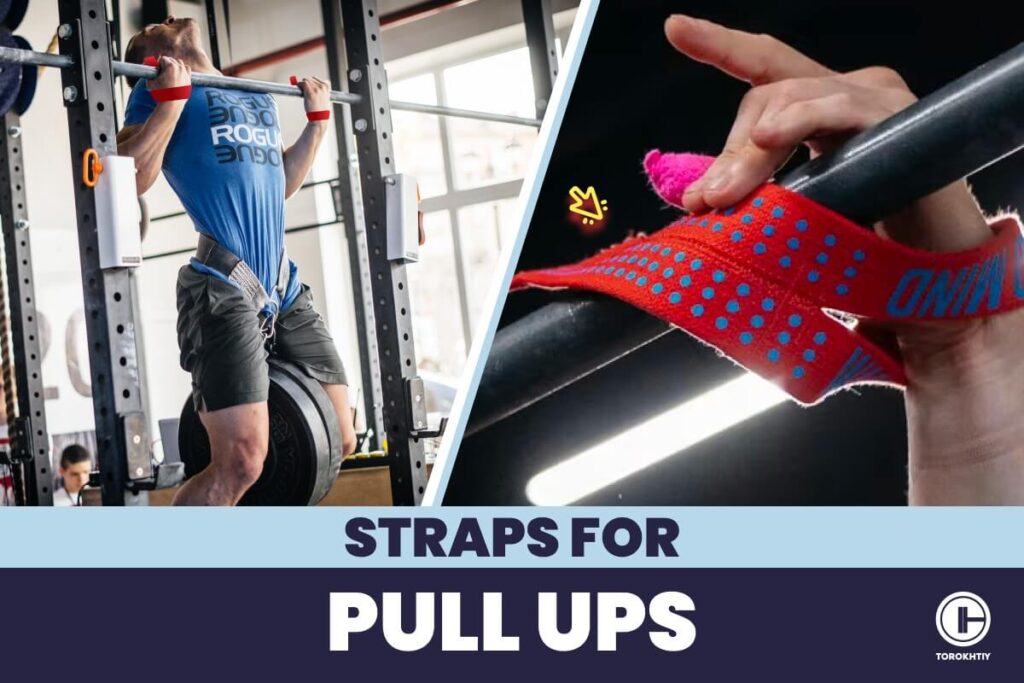
Should You Use Lifting Straps for Pull-Ups?
There’s no hard rule about whether wrist straps are good or bad—it depends on what kind of athlete you want to be as well as what kind of goals you want to achieve in terms of strength and/or hypertrophy. Here are some of the reasons you might benefit from using lifting straps for pull ups.
✅ Wrist Straps for Pull-Ups Are Great for Muscle Hypertrophy
Wrist straps can support your grip if it is not strong enough to do pull-ups, which is great if your goal is to build a muscular physical appearance since it will allow you to recruit and grow your muscles properly.
If you are just learning how to do pull-ups and want some help, wrist straps are a great way for you to get started without hurting yourself. They allow you more time under tension which means that you can build strength and muscle much faster than if you didn’t have them.
✅ Wrist Straps for Pull-Ups Are Great for Beginners
If you’re just starting to do pull-ups, a wrist strap can be a great tool to help build your strength and confidence. Wrist straps are easy to use and allow you to focus on the movement and target the back muscles rather than worrying about your grip.
If your grip strength is limiting you – straps will allow you to perform exercises like pull-ups while you can keep working on your grip strength with different exercises and at some point get rid of them and jump on pull-ups without straps.
They also provide assistance at the bottom of each rep so that you get used to engaging your back muscles throughout the exercise.
If you’re new to these movements, I’d suggest using them until you feel confident in your form—it’s not uncommon for people who have never tried them before (or haven’t tried them in 10 years) to use wrist straps for their first few workouts until they get used to the movement. As long as you don’t plan to rely on them for life, then you’re good to go!
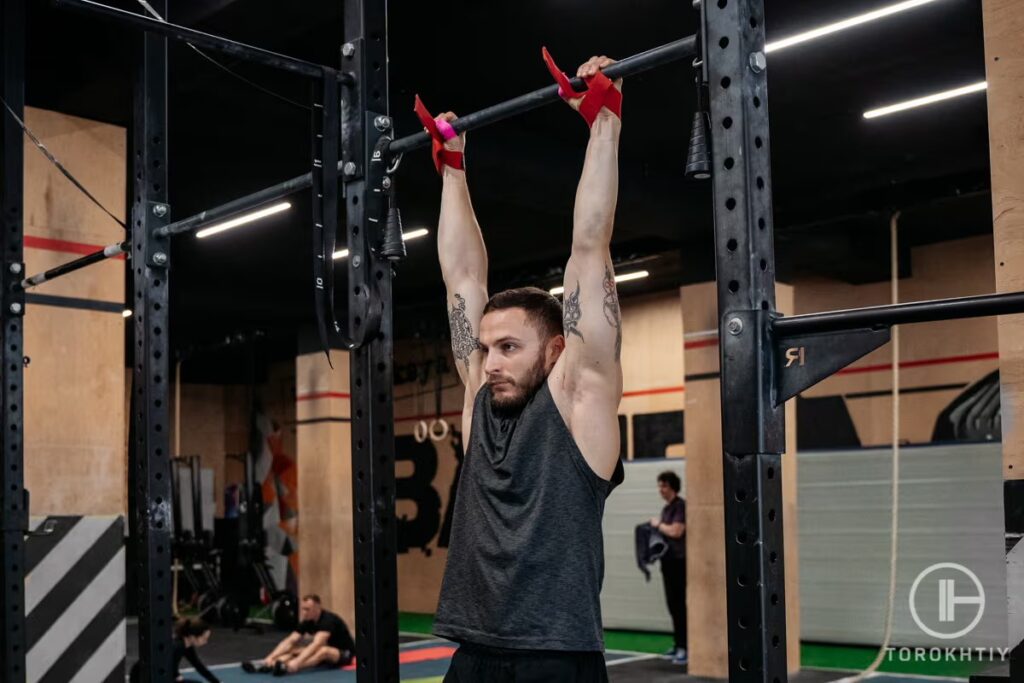
✅ Wrist Straps for Pull-Ups Help With Form and Muscle Recruitment
Wrist straps are a popular way to make pull-ups easier. They can help you focus on your form, and they also do a great job of helping you recruit muscles that you might not be using if you’re struggling with your grip strength.
Cons of Pull-up Straps
The biggest downside to using straps is that it can actually make your hand grip weaker. When you’re gripping the bar for a pull-up, your grip should be tight and firm.
But if you’re using straps, that’s not how your muscles are being trained.
Instead of having to squeeze hard with your entire forearm muscle group and keep it locked in place while the movement happens—which will strengthen those muscles over time—you have a degree of slack in the system.
In essence: If you use straps too much, then when it comes time for real-life situations where there’s no equipment available (or not enough), you might find yourself unable to perform well due to weak hands!
Moreover, there’s another important reason why people shouldn’t use these types of attachments too often: they can be dangerous! If done incorrectly they could cause serious injuries.
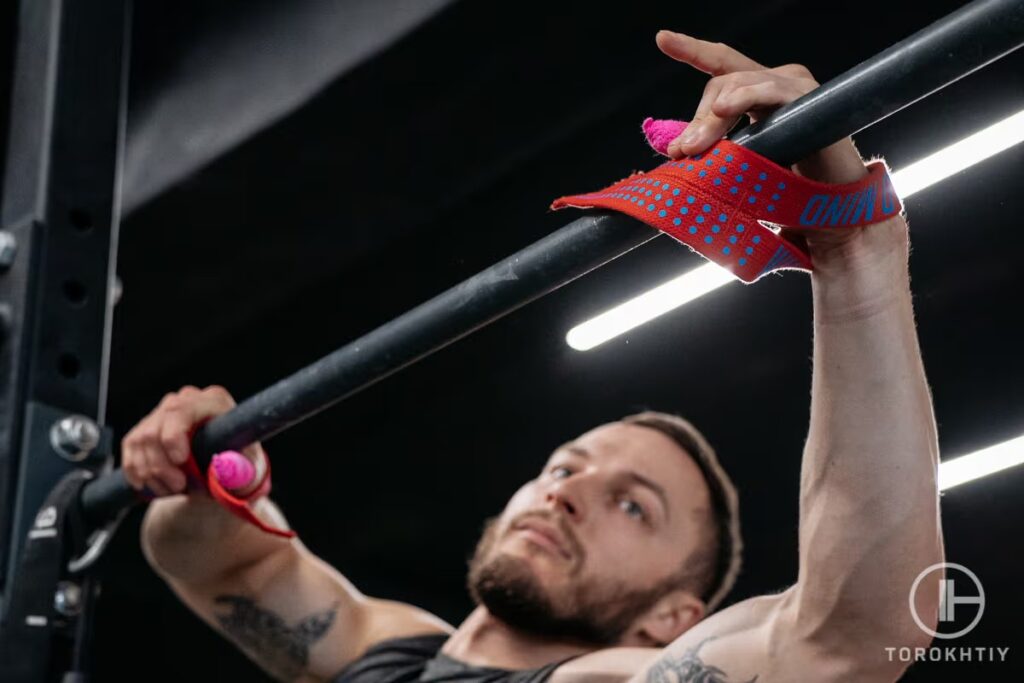
How to Use Lifting Straps for Pull-Ups?
To use a lifting strap for pull-ups:
Step 1: Choose the Right Lifting Straps for You
There are different kinds of lifting straps and it’s vital that you use one that’s perfect for the exercise. When it comes to pull-ups, I recommend using lasso straps as they’re easier to grip and they won’t have you stuck to the bar.
Step 2: Loop Your Wrist Through
Put one hand in a loop. Make sure that the tail is touching your palm and that your palm is facing away from you. Once that’s done, repeat the process on your other hand.
Step 3: Wrap the Straps Over the Bar
Fasten the straps to the bar starting with your non-dominant hand. Wrap the strap’s tail around the bar so that the loose end is underneath the bar. Keep wrapping until you find what feels right but make sure that you’re not covering one loop beneath another one.
To tighten up the straps, simply twist your wrists towards the bar as needed.
Step 4: Time to Pull Up!
Once you’re sure that you’re secured, you can now perform some pull-ups! Just reverse the procedure in between sets to allow your wrist to rest.
Warm Body Cold Mind Lasso Lifting Wrist Straps
We recommend the Warm Body Cold Mind Lasso Lifting Wrist Straps for pull-ups. They’re made of a durable, lightweight material that isn’t too thick or thin and has a triple stitching design to keep them strong and secure. Plus, they are not only great to use for pull-ups but for other lifting exercises as well.
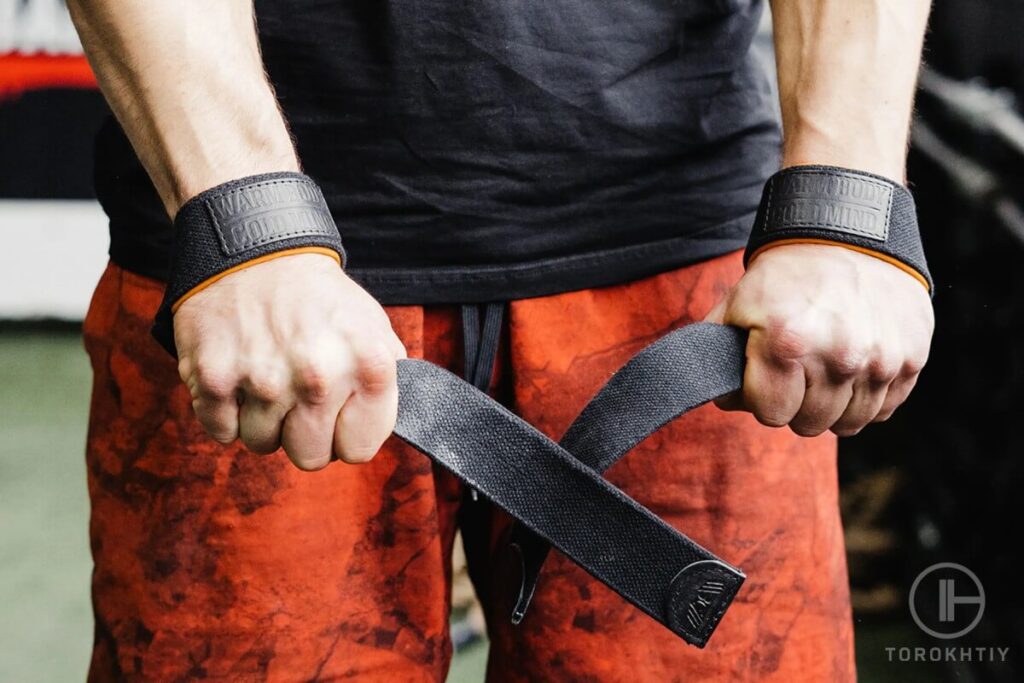
FAQ
Should You Use Straps on Lat Pulldown?
Generally, we do not recommend using straps on lat pulldown. If the movement becomes tough because your grip strength isn’t up to par, you can just simply lower the weight to the level you can work with and work your way up from there.
It also may be a time to work on your grip strength and endurance. However if for some reason grip strength limits your ability to perform exercise correctly (like because of grip fatigue) straps are the way to go.
Can You Use Figure 8 Straps for Pull-Ups?
Yes! Figure 8 straps are a great choice for pull-up exercises. They’re versatile and can be used for many different workouts, including rows and chin-ups. They also make a good option if you have trouble keeping your grip at an optimal level during certain exercises (like pull-ups).
Conclusion
There are many benefits to using wrist straps when doing pull-ups, but there are also some drawbacks. In the end, it’s up to you and your goals. If you want more muscle and breaking personal records is important, then give them a try!
Don’t forget to share your thoughts or leave some questions in the comment section below.
Also read:
- How to Use Figure 8 Straps
- Using Wrist Straps for Deadlift
- Use Weight Lifting Straps
- Best Lifting Straps
- Best Figure 8 Lifting Straps
- Workout Straps
- Nylon Lifting Straps
References:
- The Benefits of Pullups // Healthline: https://www.healthline.com/health/exercise-fitness/benefit-of-pull-up.
- How to Master the Pullup // Healthline: https://www.healthline.com/health/pull-ups#why-its-worth-learning.
- All photos are made by Torokhtiy Media team.
Why Trust Us?
With over 20 years in Olympic weightlifting, strength training, nutrition coaching, and general fitness our team does its best to provide the audience with ultimate support and meet the needs and requirements of advanced athletes and professional lifters, as well as people who strive to open new opportunities and develop their physical capabilities with us.
By trusting the recommendations of our certified experts in coaching, nutrition, and sports training programming, as well as scientific consultants, and physiotherapists, we provide you with thorough, well-considered, and scientifically proven content. All the information given in the articles concerning workout programming, separate exercises, and athletic performance, in general, is based on verified data.
The product testing process is described in more detail here.
Author: Ihor Shymechko
Pro Olympic Weightlifter, Coach
Best Results: Snatch – 208 kg,
C&J – 240 kg
Ihor has been a professional weightlifter since 1996, boasting over two decades of competition experience. His notable achievements include clinching the European Championship in 2009 and securing a silver medal in the 105kg division at the Senior World Championships in 2011. Ihor represented his country in the 2008, 2012, and 2016 Summer Olympics. After retiring from competitive weightlifting, he transitioned to coaching, leveraging his vast experience to guide athletes who now compete on both national and international stages.
Reviewed by: Jacek Szymanowski
Certified Nutritionist,
M.Sc.Eng. Biotechnology
Performance architect,
Strength and Conditioning Specialist
With over 30 years of fighting experience, specialization in nutrition coaching for athletes, and expertise in metabolic health and dietary strategies, Jacek offers a comprehensive approach to optimizing your performance and well-being. Backed by a Master of Science degree in Biotechnology, Jacek remains at the forefront of scientific advancements, ensuring that his coaching is always evidence-based and up-to-date.




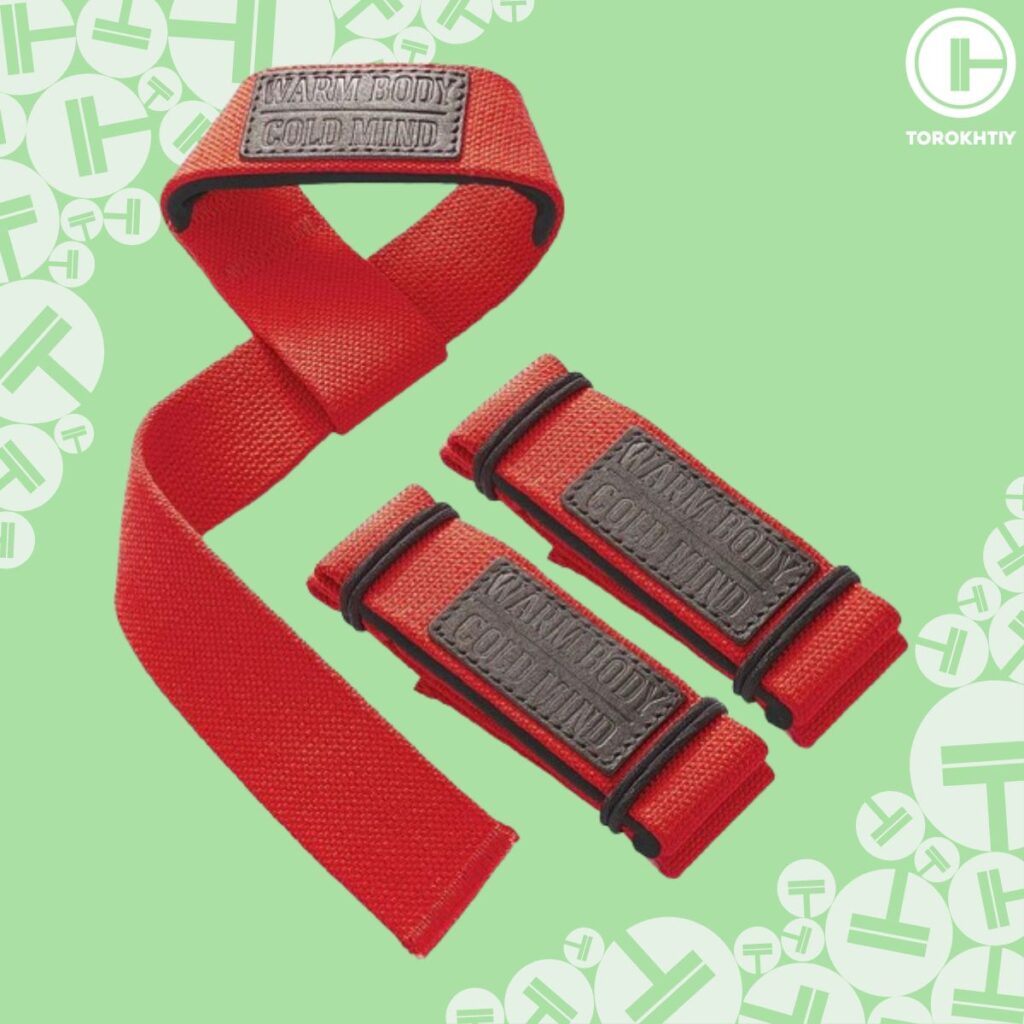
Still have questions after reading our article? Unlock your full potential by engaging with our experts and community! Don’t hesitate — leave a comment below and Ihor Shymechko will provide a personalized answer and insights to help you reach your goals.